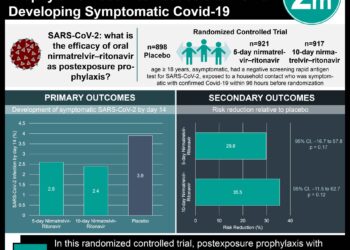Hydroxychloroquine and azithromycin do not improve clinical outcomes in mild-to-moderate Covid-19
1. Hydroxychloroquine use with or without azithromycin did not improve clinical outcomes at fifteen days when compared with standard of care in hospitalized patients with mild-to-moderate Covid-19.
2. A higher rate of side effects – including QT prolongation and elevated liver enzymes – was observed in patients taking hydroxychloroquine alone or in combination with azithromycin.
Evidence Rating Level: 1 (Excellent)
Study Rundown: Hydroxychloroquine had been a therapeutic of significant focus throughout the Covid-19 pandemic and, in combination with azithromycin, was among the first to be trialed in clinical practice. As a result, there had been a 2000% year over year increase in prescriptions for hydroxychloroquine reported in March 2020. Until recently, the body of literature assessing the efficacy of hydroxychloroquine had been limited primarily to observational studies and had yet to demonstrate compelling evidence advocating for its use. This randomized controlled trial showed hydroxychloroquine use, alone or in combination with azithromycin, did not lead to a clear improvement in clinical outcomes after fifteen days in hospitalized patients with mild-to-moderate Covid-19. This complemented the growing consensus regarding the lack of benefit of hydroxychloroquine in the treatment of Covid-19 – allowing for the continued redirection of efforts towards alternative treatments. The inclusion of the azithromycin arm further distinguished the trial from others recently released. The higher rate of side effects in those taking hydroxychloroquine, including elevations in liver enzymes and QT prolongation traditionally associated with the study drugs, is particularly important given the altogether lack of clinical benefit observed thus far. Limitations of the study included its inclusion of an unvalidated ordinal scale as a surrogate assessment of clinical status, short follow-up duration, lack of blinding, and inclusion of patients receiving doses of hydroxychloroquine or chloroquine for less than twenty four hours within its standard of care arm.
Click to read the study in NEJM
Relevant Reading: Hydroxychloroquine in Nonhospitalized Adults With Early COVID-19
In-Depth [randomized controlled trial]: A total of 667 patients were recruited and underwent randomization in a 1:1:1 fashion to receive hydroxychloroquine plus azithromycin, hydroxychloroquine alone, or standard of care between March 29 and May 17, 2020 across 55 hospitals in Brazil. Patients were eligible if they were 18 years of age or older, hospitalized with Covid-19, and less than fourteen days from symptom onset. Given issues with recruitment, prior use of hydroxychloroquine or chloroquine was permissible if used for less than twenty hours. The study focused on mild-to-moderate cases of Covid-19 and consequently excluded patients on any level of supplemental oxygen support in excess of four liters via nasal cannula. Clinical status at fifteen days served as the primary outcome and assessed by a seven-level ordinal scale – accounting for severity of illness primarily through hospitalization status and extent of respiratory support. Prior to the first interim analysis, the study population was adjusted to a modified intention to treat population, comprised of patients with only polymerase-chain-reaction (PCR) confirmed Covid-19. In these patients with confirmed Covid-19, there were no significant differences in the proportional odds of a worsening clinical status at fifteen days for those receiving hydroxychloroquine and azithromycin vs. standard of care (OR 0.99, 95% 0.57-1.73). A similar lack of difference was observed in those taking hydroxychloroquine alone (OR 1.21, 95% CI 0.69-2.11). No significant differences were observed in any secondary outcomes including number of days free from respiratory support, use of mechanical ventilation, thromboembolic complications, or in-hospital death. A greater number of those taking hydroxychloroquine – either alone (33.7%) or in combination with azithromycin (39.3%) – reported a side effect when compared to those not taking either trial drug (22.6%). The difference was particularly notable in the prevalence of QT interval prolongation (defined as a QT interval greater than 480ms within 7 days of drug initiation) which occurred in 17/116 (14.6%) of those taking hydroxychloroquine alone, 13/89 (14.7%) of those taking both hydroxychloroquine and azithromycin, and 1/58 (1.7%) of patients not taking either drug. Electrocardiogram monitoring, notably, was not routinely done across all groups.
Image: PD
©2020 2 Minute Medicine, Inc. All rights reserved. No works may be reproduced without expressed written consent from 2 Minute Medicine, Inc. Inquire about licensing here. No article should be construed as medical advice and is not intended as such by the authors or by 2 Minute Medicine, Inc.







